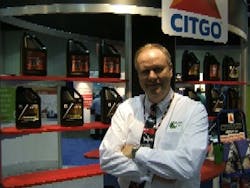Talked with Mark Betner recently, manager of heavy-duty lubricants for Citgo, at the Technology & Maintenance Council‘s annual meeting down in Florida (And NO, there won‘t be any video of me flapping my gums this time - which I‘m sure is a relief to many out there).
Betner‘s been a longtime advocate that the U.S. trucking industry needs to switch to a lighter weight for its engine oils - dropping to a 5W-40 grade from the 15W-40 standard almost all heavy-duty truck owners now use. His contention, backed by long experience in the European market, is that heavier-weight oil doesn‘t provide extra protection, which is a widely held belief among truckers.
(Mark Betner, Citgo's manager of heavy-duty lubricants)
In fact, lightweight 5W-40 oil can provide even better protection, as it offers a much wider temperature range (down to minus 25 degrees Fahrenheit) of operating effectiveness. That thinner viscosity is good in another way, said Betner, as it means there‘s less fluid for the engine to “work” through - and if the engine doesn‘t have to work as hard, fuel economy can improve.
“Europe‘s been a far stronger advocate of lightweight viscosity engine oil grades because their fuel coats are almost double ours,” Betner explained to me. “And we‘re just now recognizing that lighter viscosity grades can give you a fuel economy advantage. In fact, Eaton just did a study showing that lighter weight synthetic lubricants can translate into fuel efficiency gains.”
On-highway tests conducted by Roadranger - a marketing partnership between Eaton and Dana Corp. - indicates that using synthetic lubricant in both components can translate into fuel economy gains of more than 1%.
The tests - comparing new Roadranger Synthetic Lubricants to traditional synthetic blends and semi-synthetic blends - involved two U.S. linehaul fleets, with a third conducted by an independent research facility. The tests - using an SAE Type III 1526 test, a TMC/SAE J1321 test, along with a modified J1376 test - showed both linehaul carriers on average improved fuel economy 1.029%, with the independent research facility generating fuel savings of 1.112%.
“This is a significant finding when you take into account that every 1% improvement amounts to about $500 in annual fuel savings per truck,” commented Rick Muth, lubricants manager for Roadranger. “Our previous Roadranger lubricant blends were already producing fuel saving benefits of 2% and 4% over mineral-based lubricants, so the additional savings is a further bonus.”
Citgo‘s Betner told me that while a 1% fuel efficiency improvement may not sound like much, when you extrapolate that gain out across a fleet of 100 trucks operating in typically longhaul on-highway applications, you‘re talking about saving $80,000 a year in fuel costs. “Three dollar-plus diesel has changed everything,” Betner said.
Will thinner, lightweight engine oils gain traction in the U.S. market? The jury is still out for now on that. One thing is for certain, though: as fuel continues to get more costly, fleets are going to look at everything and anything to try and improve fuel efficiency - and that includes what grade of engine oil they use, I suspect.
